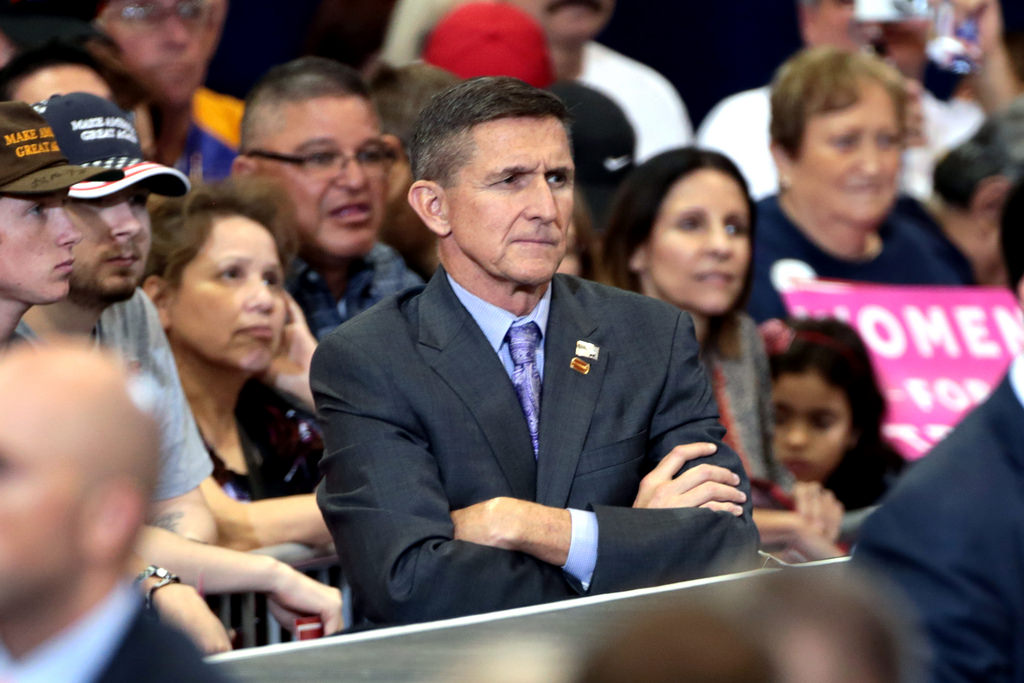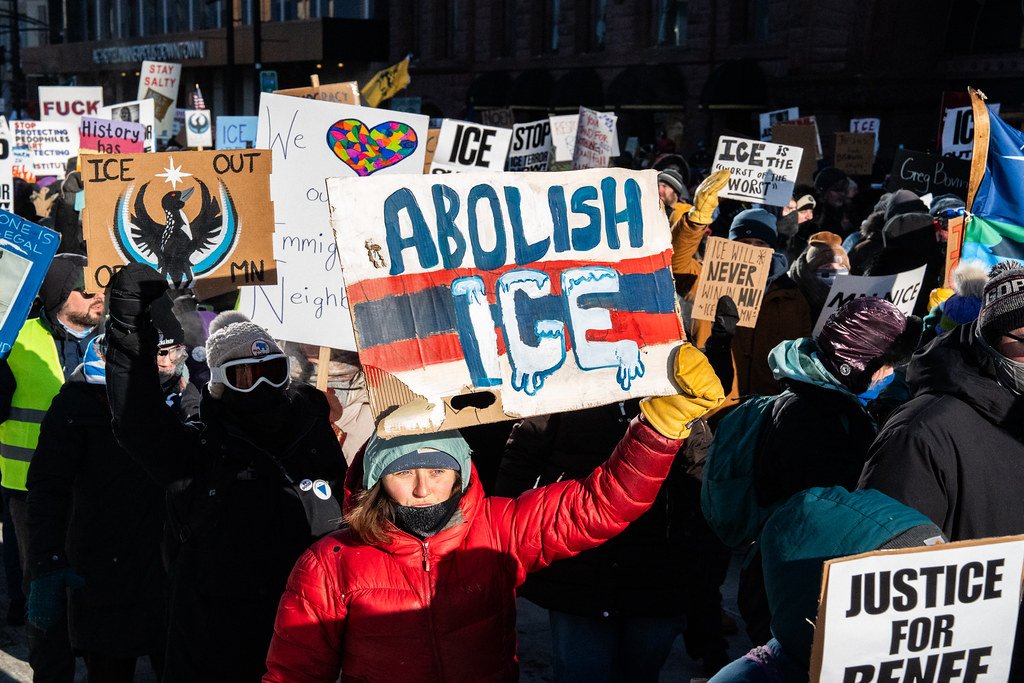The Flynn Plea: A Quick and Dirty Analysis
The news that former national security adviser Michael Flynn has reached a cooperation and plea deal with Special Counsel Robert Mueller could not come as less of a surprise. Reports of Flynn’s bizarre behavior across a wide spectrum of areas began trickling out even before his tenure as national security adviser ended after only 24 days. These behaviors raised a raft of substantial criminal law questions that have been a matter of open speculation and reporting for months.

The news that former national security adviser Michael Flynn has reached a cooperation and plea deal with Special Counsel Robert Mueller could not come as less of a surprise. Reports of Flynn’s bizarre behavior across a wide spectrum of areas began trickling out even before his tenure as national security adviser ended after only 24 days. These behaviors raised a raft of substantial criminal law questions that have been a matter of open speculation and reporting for months. His problems include, among other things, an alleged kidnapping plot, a plan to build nuclear power plants all over the Middle East, alleged violations of the Foreign Agents Registration Act (FARA) involving at least two different countries, and apparent false statements to the FBI. In light of the scope and range of the activity that reputable news organizations have attributed to Flynn, it is no surprise that he has agreed to cooperate with Mueller in exchange for leniency.
The surprising thing about the plea agreement and the stipulated facts underlying it is how narrow they are. There’s no whiff of the alleged Fethullah Gulen kidnapping talks. Flynn has escaped FARA and influence-peddling charges. And he has been allowed to plead to a single count of lying to the FBI. The factual stipulation is also narrow. It involves lies to the FBI on two broad matters and lies on Flynn’s belated FARA filings on another issue. If a tenth of the allegations against Flynn are true and provable, he has gotten a very good deal from Mueller.
The narrowness gives a superficial plausibility to the White House’s reaction to the plea. Ty Cobb, the president’s ever-confident attorney, said in a statement: “The false statements involved mirror the false statements [by Flynn] to White House officials which resulted in his resignation in February of this year. Nothing about the guilty plea or the charge implicates anyone other than Mr. Flynn.” Cobb reads Friday’s events as an indication that Mueller is “moving with all deliberate speed and clears the way for a prompt and reasonable conclusion” of the investigation.
This is very likely not an accurate assessment of the situation. If Mueller were prepared to settle the Flynn matter on the basis of single-count plea to a violation of 18 U.S.C. § 1001, he was almost certainly prepared to charge a great deal more. Moreover, we can infer from the fact that Flynn accepted the plea deal that he and his counsel were concerned about the degree of jeopardy, both for Flynn and for his son, related to other charges. The deal, in other words, reflects the strength of Mueller’s hand against Flynn.
It reflects something else too: that Flynn is prepared to give Mueller substantial assistance in his investigation and that Mueller wants the assistance Flynn can provide. We are not going to speculate about what that assistance might be. But prosecutors do not give generous deals in major public integrity cases to big-fish defendants without good reason—and in normal circumstances, the national security adviser to the president is a very big fish for a prosecutor. The good reason in this case necessarily involves the testimony Flynn has proffered to the special counsel’s staff. The information in that proffer is not in any of the documents released Friday, and it may not even be related to the information in those documents. Prosecutors tend to trade up. That is, for Mueller to give Flynn a deal of this sort, the prosecutor must believe he is building a case against a bigger fish still.
There’s another peculiar nuance: Section 3 of the plea agreement leaves Flynn unprotected against certain future prosecutions. The section is titled “Additional Charges” and states in its entirety that “In consideration of your client’s guilty plea to the above offense, your client will not be further prosecuted criminally by this Office for the conduct set forth in the attached Statement of the Offense” (emphasis ours). The office, in other words, seems to be reserving the right to prosecute Flynn for conduct not set forth in that document, which is to say all of the other conduct on which he might be vulnerable. It is hard to know what to make of this language. It could mean nothing at all. It could mean that the threat of further prosecution is being held over Flynn’s head if he does not hold up his end of the bargain. It could mean that another plea agreement covering other matters is coming.
What Flynn Admits
Narrow though their coverage is, the documents released Friday shed a lot of light on several aspects of L’Affaire Russe. Let’s start with the facts to which Flynn has admitted.
According to the statement of the offense, on Jan. 24, 2017, Flynn voluntarily agreed to an interview with FBI agents, during which he said “he did not ask Russia’s Ambassador to the United States … to refrain from escalating the situation in response to sanctions that the United States had imposed against Russia.” He also said “he did not remember a follow-up conversation in which the Russian Ambassador stated that Russia had chosen to moderate its response” in response to Flynn’s requests.
Those statements were false. Flynn now says he knew during the Jan. 24 interview that on Dec. 28, President Barack Obama had signed an executive order imposing sanctions against Russia for its interference in the 2016 presidential election. That same day, Russian Ambassador Sergey Kislyak contacted Flynn.
The next day, Flynn “called a senior official of the Presidential Transition Team … who was with other members of the Presidential Transition Team at the Mar-a-Lago resort … to discuss what, if anything, to communicate to the Russian Ambassador” about the sanctions. Flynn’s conversation with the transition-team official included “the impact of those sanctions on the incoming administration’s foreign policy goals” and “that the members of the Presidential Transition Team at Mar-a-Lago did not want Russia to escalate the situation.”
Immediately after the Mar-a-Lago phone call, Flynn called Kislyak to ask “that Russia not escalate the situation and only respond to the U.S. Sanctions in a reciprocal manner.” Shortly after his conversation with Kislyak, Flynn called the official at Mar-a-Lago again “to report on the substance of his call with the Russian Ambassador, including their discussion of the U.S. Sanctions.” Flynn knew that on Dec. 30, “Vladimir Putin released a statement indicating that Russia would not take retaliatory measures in response to the U.S. Sanctions at that time.” On Dec. 31, Kislyak called Flynn “and informed him that Russia had chosen not to retaliate in response to [his] request.” Flynn then “spoke with senior members of the Presidential Transition Team about [his] conversations with the Russian Ambassador regarding U.S. Sanctions and Russia’s decision not to escalate the situation.”
Sanctions aren’t the only subject on which Flynn acknowledges making false statements. During the Jan. 24 interview, Flynn also made false statements “about calls he made to Russia and several other countries regarding a resolution submitted by Egypt” to the U.N. Security Council on Dec. 21, 2016, condemning Israeli settlements. Flynn told FBI agents “that he only asked the countries’ positions on the vote, and that he did not request that any of the countries take any particular action on the resolution.” He “also falsely stated that the Russian Ambassador never described to him Russia’s response to [his] request regarding the resolution.”
Flynn now admits that he knew at the time that the Security Council was scheduled to vote on the resolution Dec. 22, the day after it was introduced. On Dec. 22, “a very senior member of the of the Presidential Transition Team directed [Flynn] to contact officials from foreign governments, including Russia, to learn where each government stood on the resolution and to influence those governments to delay the vote or defeat the resolution.” (Note the word “very” before “senior” in that sentence.) That day, Flynn contacted Kislyak about the vote. He “informed the Russian Ambassador about the incoming administration’s opposition to the resolution, and requested that Russia vote against or delay the resolution.” The following day—Dec. 23—Flynn spoke to Kislyak, who told Flynn that “if it came to a vote Russia would not vote against the resolution.”
Finally, Flynn made false statements in FARA filings pertaining to a project that his company, the Flynn Intel Group, performed “for the principal benefit of the Republic of Turkey.” Flynn made “materially false statements and omissions,” including that (1) the Flynn Intel Group “did not know whether or the extent to which the Republic of Turkey was involved in the Turkey project”; (2) “the Turkey project was focused on improving U.S. business organizations’ confidence regarding doing business in Turkey”; and (3) an op-ed that Flynn wrote and “published in The Hill on November 8, 2016 was written at his own initiative.” He also omitted “that officials from the Republic of Turkey provided supervision and direction over the Turkey project.”
What It All Means
The most important revelation here is that contrary to Cobb’s statement Friday morning, Flynn is saying clearly that he was not a rogue actor but was operating at the behest of the presidential transition team. He states that a “very senior member of the Presidential Transition Team,” a “senior official of the Presidential Transition Team” and “senior members of the Presidential Transition Team” were involved in directing his actions. The stipulated facts also make clear that Flynn reported back to the transition on his conversations with Kislyak.
Second, take a moment to remember the context in which Flynn’s underlying conduct took place: He and apparently the Trump transition team were working to undermine U.S. foreign policy goals endorsed by both parties. In December 2016, President Obama authorized sanctions against Russia in response to cyber-enabled election interference. He did so with broad bipartisan support to deter such activity in the future against the U.S. and its allies. The shared bipartisan—even nonpartisan—goal was to protect foundational elements of democracy and legitimacy. To the extent that there was mainstream criticism of the action, it was for being too weak, not for being too aggressive with respect to Russia.
Susan Hennessey and Matt Tait wrote at the time about why it was important to respond to Russian interference in the U.S. election:
It is critical that we revisit the question of Russia’s role now, not as a means to extract vengeance or to delegitimize the election result, but because there remains an urgent need for a response that establishes credible deterrence against future attacks on the United States and its allies which is currently lacking… [W]e can expect Russia to stay the course of using cyber attacks and disinformation strategies to disrupt Western democracies unless and until it is—as [GOP Senator Lindsey] Graham puts it—forced to “pay a price.” And considering what is at stake to gain and to lose, that price must be steep.
When the sanctions against Russia were announced, there was a flurry of reports regarding possible retaliation by the Russians, including a plan to close the American school in Moscow and to expel U.S. diplomats. Then, quite unexpectedly, Putin reversed course and decided not to retaliate at all.
Shortly thereafter, Donald Trump tweeted:
Great move on delay (by V. Putin) - I always knew he was very smart!
— Donald J. Trump (@realDonaldTrump) December 30, 2016
At the time, the big question was whether Putin was “smart” to not retaliate because he somehow knew the sanctions wouldn’t remain in place. We now know the reality: Flynn had given the Russian government reason to believe that. The only reasonable way to describe that conduct, both now and at the time, is that Flynn—apparently at the direction of more senior Trump officials—was working in conjunction with the government of Russia against American interests as defined by the U.S. president (and supported by congressional Republicans and Democrats) at the time.
Next, there are the public statements made by members of the Trump administration concerning Flynn’s contact with the Russian ambassador—statements that in retrospect are clearly untrue. David Ignatius of the Washington Post broke the story about Flynn’s contacts with Kislyak in early January. As Kate Brannen recapped at Just Security at the time, over the next few days, the White House offered an ever-shifting series of explanations regarding those calls. First, Trump officials said it was a single call related to logistics for a later official call. Then-White House Press Secretary Sean Spicer changed the story to say that there had been a call related to Christmas greetings, a conference in Syria on Islamic State, and setting up a call between Trump and Putin following the inauguration, and then a follow-up call to set up details for the post-inaugural call. Spicer’s story transformed over time to also include a series of text messages.
This all culminated in Vice President-elect Mike Pence going on national television multiple times on Jan. 15 to expressly state that no sanctions were discussed during the calls between Flynn and Kislyak. That day, Pence had the following exchange with John Dickerson of “Face the Nation”:
DICKERSON: Let me ask you about it was reported by David Ignatius that the incoming national security advisor Michael Flynn was in touch with the Russian ambassador on the day the United States government announced sanctions for Russian interference with the election. Did that contact help with that Russian kind of moderate response to it? That there was no counter-reaction from Russia. Did the Flynn conversation help pave the way for that sort of more temperate Russian response?
PENCE: I talked to General Flynn about that conversation and actually was initiated on Christmas Day he had sent a text to the Russian ambassador to express not only Christmas wishes but sympathy for the loss of life in the airplane crash that took place. It was strictly coincidental that they had a conversation. They did not discuss anything having to do with the United States’ decision to expel diplomats or impose censure against Russia.
DICKERSON: So did they ever have a conversation about sanctions ever on those days or any other day?
PENCE: They did not have a discussion contemporaneous with U.S. actions on--
DICKERSON: But what about after--
PENCE: --my conversation with General Flynn. Well, look. General Flynn has been in touch with diplomatic leaders, security leaders in some 30 countries. That’s exactly what the incoming national security advisor--
DICKERSON: Absolutely.
PENCE: --should do. But what I can confirm, having spoken to him about it, is that those conversations that happened to occur around the time that the United States took action to expel diplomats had nothing whatsoever to do with those sanctions.
DICKERSON: But that still leaves open the possibility that there might have been other conversations about the sanctions.
PENCE: I don’t believe there were more conversations.
The fact that Pence felt compelled to refute these stories demonstrates that the Trump team understood the gravity of the accusation and why having contacts related to sanctions would be deeply improper. We now know that the Trump transition was, in fact, informed by Flynn of “the substance of his call with the Russian Ambassador, including their discussion of U.S. Sanctions.”
In early February, the Washington Post broke the story that, contrary to the White House’s multiple assertions, Flynn had discussed sanctions in calls with Kislyak. Not only that, but the contents of the communications had been picked up in intelligence intercepts (presumably targeting Kislyak) and the substance of the conversations was sufficiently concerning that Flynn was the subject of a counterintelligence investigation.
A few days later, Flynn was forced to resign, ostensibly for lying to Pence. In his resignation letter, Flynn said that “because of the fast pace of events, I inadvertently briefed the vice president-elect and others with incomplete information regarding my phone calls with the Russian ambassador,” and he apologized to the administration. Friday’s revelations make clear that if Pence was, in fact, misled by Flynn, the transition team more broadly was not. The White House, to put it bluntly, appears to have serially made statements to the American public that at least some key officials beyond Flynn knew to be untrue.
Finally, the Flynn documents cast in new light our understanding of certain previously reported events during the first few months of the Trump administration: Sally Yates’s warning to the White House about Flynn’s misrepresentations and the infamous “loyalty oath” request to James Comey. The statement of offense tells us more about what Yates likely meant when she reportedly warned White House Counsel Don McGahn on Jan. 26—two days after Flynn’s FBI interview—that Flynn had lied to the vice president about his contacts with Russians and that he was vulnerable to blackmail. In testimony to the Senate Judiciary Committee in May, Yates said she could not say whether Flynn had lied to the FBI because it would compromise an “ongoing FBI investigation.”
Flynn was sworn in as national security adviser on Jan. 22, 2017, and the FBI interviewed him about his exchanges with Kislyak only two days later, on Jan. 24. It was in that interview that he denied the conversations in December. Later that week, on Jan. 26, the acting attorney general, Yates, reportedly warned the White House counsel that Flynn had lied about his contact with Kislyak. On Jan. 27, Yates and McGahn had another meeting, after which (according to then-press secretary Sean Spicer) McGahn determined that Flynn had not broken any laws. The same day, Trump reportedly sat down for dinner with then-FBI Director Comey and asked for a pledge of loyalty.
The Flynn plea both clarifies and raises questions about this timeline. It answers the question of what precisely concerned Yates, a matter on which she could not testify with precision because of investigative secrecy. Assuming she was aware of the truth of Flynn’s interactions with Kislyak, she would have known he had lied to the FBI, as he has now admitted.
But Flynn’s story raises new questions about the president’s interactions with Comey. President Trump has denied that he knew Flynn had talked sanctions with Kislyak. Asked at a Feb. 16 press conference, “Did you direct Mike Flynn to discuss the sanctions with the Russian Ambassador,” Trump responded: “No, I didn’t. No, I didn’t.” When pressed on why he fired Flynn, Trump’s answer concluded, “No, I fired him because of what he said to Mike Pence, very simple. Mike was doing his job. He was calling countries and his counterparts. So it certainly would have been okay with me if he did it. I would have directed him to do it if I thought he wasn’t doing it. I didn’t direct him but I would have directed him because that’s his job … No, I didn’t direct him, but I would have directed him if he didn’t do it, okay?”
It isn’t clear from the Flynn documents whether Trump specifically was informed of Flynn’s activities, though ABC News reported Friday that a confidant of Flynn’s said that Flynn is prepared to testify that Trump directed him to contact the Russians. Adding to current ambiguity, the Washington Post has separately reported that people familiar with the matter have said Jared Kushner was the “very senior” transition team member who instructed Flynn to contact Russia on the U.N. resolution.
What is clear is that when Trump demanded loyalty from Comey in January and later, on Feb. 14, when he asked that Comey drop the Flynn matter, he did so with at least senior transition aides fully aware of Flynn’s behavior, with his White House aware that Flynn’s interview had raised alarm bells at the Justice Department, and with a White House that had been actively misrepresenting the matter.
All of which is to say: Color us less confident than Cobb that the Flynn plea moves this matter toward a conclusion any time in the near future.






.png?sfvrsn=48e6afb0_5)


